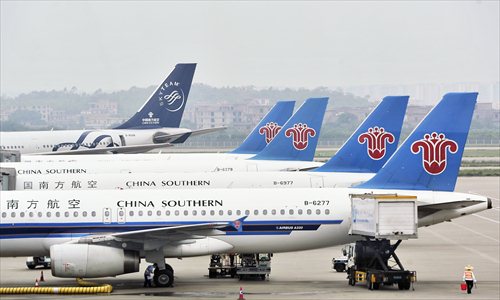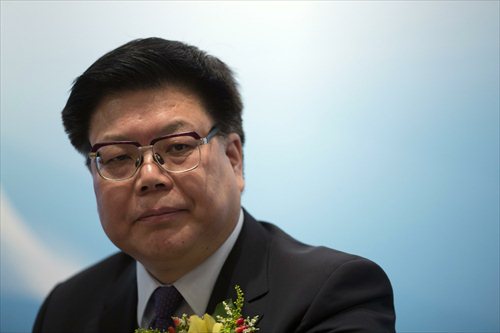HOME >> BUSINESS
Management shifts at leading domestic carriers quash merger talk
By Wang Jiamei Source:Global Times Published: 2016-3-1 22:23:04
Aviation sector not in need of structural reform, analysts say

Aircraft from China Southern Airlines park at Guangzhou Baiyun International Airport in South China's Guangdong Province. File photo: CFP

Wang Changshun Photo: CFP
China Southern Air Holding Co (CSAH) named a new head on Tuesday morning, the latest senior personnel change in the country's aviation sector, a development that experts said basically eliminated the possibility of major mergers in the industry.
Wang Changshun, vice minister of transport, was appointed general manager and deputy Party chief of CSAH in an internal meeting, an insider from the company confirmed to the Global Times Tuesday.
The appointment is the latest in a series of personnel changes at the senior level in China's aviation industry.
On Monday, Song Zhiyong, president of Air China, was appointed Party chief of its parent company, China National Aviation Holding Co (CNAH).
On December 28, 2015, the Civil Aviation Administration of China (CAAC) announced the appointment of Feng Zhenglin as its new Party chief.
Industry observers have been expecting major mergers in the aviation sector, similar to those that took place among bullet train producers and in the shipping sector under the country's reform agenda for major State-owned enterprises (SOEs).
The country's two leading bullet train manufacturers - China CNR Corp and CSR Corp - announced a merger at the end of 2014. Shipping giants China Ocean Shipping (Group) Co (COSCO) and China Shipping (Group) Co has merged in January.
But the recent personnel changes in the aviation sector indicate that similar mergers are unlikely, observers said. Otherwise, there would have been no point in naming new heads of the organizations involved.
While senior personnel changes at State-owned enterprises (SOEs) and relevant authorities are usually seen as signals of reform, Lin Zhijie, an independent market watcher, said this round of personnel reshuffles in the aviation sector did not mean the same thing.
Not every centrally administrated SOE needs to merge. Such deals require some "logic and purpose" of their own, Lin said. The rail companies' merger was mainly aimed at boosting their competitiveness in the global market, while the deal between COSCO and China Shipping (Group) Co was intended to achieve economies of scale to help reduce losses amid an industry slowdown.
"But the civil aviation sector is closely related to the public interest, meaning that monopolies must be curbed or avoided in the sector," Lin noted. "Besides, the industry is not burdened with huge losses or designated to pursue overseas expansion, so there is no foundation for an industrial consolidation."
Lin also said that the personnel changes were to be expected, given that CSAH's former general manager Si Xianmin is under investigation by prosecutors for allegedly accepting bribes, as relevant authorities announced on February 15. And Li Jiaxiang and Wang Yinxiang, former Party chiefs at CAAC and CNAH respectively, have both reached retirement age.
Lin said that the changes will not bring immediate changes to the industry.
"SOEs usually have established comprehensive rules and regulations, plus strict internal controls, making it hard or unlikely for a new head to make many immediate changes," Lin noted. "Even if the new head plans a certain strategic shift or prefers a different management style, the impact may only emerge gradually over several years, not in the short term."
CSAH, CNAH and China Eastern Air Holding Co are the three largest aviation groups in China.
CSAH achieved 112.5 billion yuan in revenue in 2015, up 3 percent year-on-year, but its profits surged by 84.3 percent from the previous year, the China Business News reported in January.
Posted in: Companies